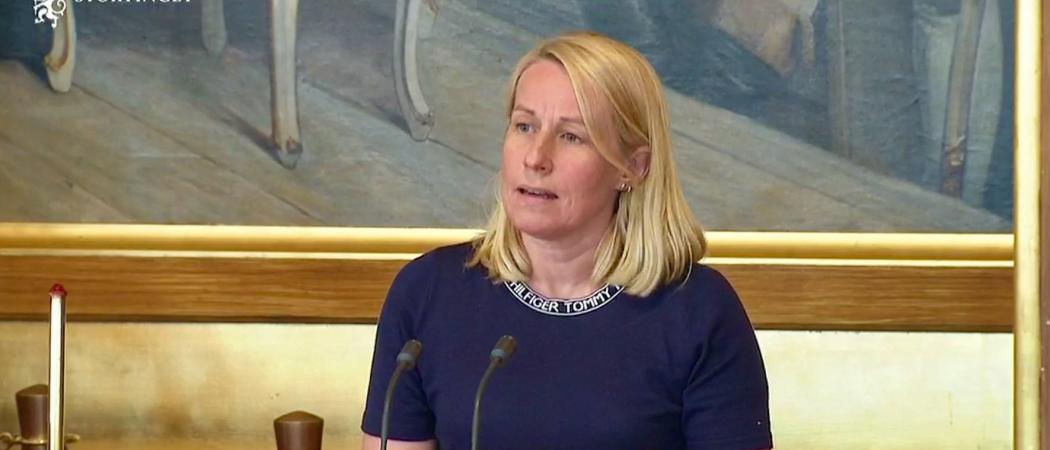Molecular biologist and former rector, now turned MP, Marianne Synnes Emblemsvåg talks to Science|Business about making parliament a more research-friendly place

Photo: Marianne Synnes Emblemsvåg
Norwegian MP Marianne Synnes Emblemsvåg is trying to shift the focus within the country’s parliament more firmly onto science, and as a cancer researcher and former rector of Aalesund University is relishing her role as one of the sector’s main champions.
“Coming from a university, it’s easier for me to see the arguments from the other side,” she says. “We can’t sit in the parliament and develop policies if we don’t know how they will affect people. I know what will work and what won’t work in the sector,” Synnes Emblemsvåg told Science|Business.
Synnes Emblemsvåg stands out in Oslo’s 169-seat parliament for being the only MP with a PhD. This experience, she says, puts her in a strong position to influence the government’s research programme, even if getting proposals to pass through a four party rightwing coalition isn’t always easy.
Speaking during the Big Challenge science festival held in Trondheim this week, the Conservative party MP said, “I don’t find it hard to define the research agenda, but I find it hard to get approval for what I want to do.”
“It’s been difficult getting other departments to notice the value of research, but it’s changing now slowly for the better,” Synnes Emblemsvåg said. “It is important that all our ministries take active part in supporting research for every sector, be it health, be it industry. They’re beginning to see that research isn’t just for the Education and Research Ministry.”
One of Synnes Emblemsvåg’s main initiatives is to open up access for researchers to health data. She wants to build a “health analysis platform” to combine health registries across the Nordic countries.
Reducing dependence on oil and gas
A major challenge for the government is to promote development of new industries. Norway invests around 2 per cent of its national income on R&D, but the economy remains heavily dependent on its giant oil and gas sector, which contributed about 21 per cent of government revenues last year.
“We’re a rich country so perhaps we’ve not always had the motivation to investigate new areas. We’re trying to establish new industries besides oil and gas,” said Synnes Emblemsvåg.
The government recently sent this message to investors when it recommended the country’s near-$1 trillion sovereign wealth fund sell holdings in oil and gas exploration and production companies. Norway’s massive energy sector will continue to be a central part of the economy for many years. “But we can see the end of it coming,” Synnes Emblemsvåg said.
And as concerns about climate change continue to grow, Synnes Emblemsvåg says, “We have an obligation to do research on the environment. We have a huge coastline, so we must continue looking at our ocean and seeing how we can use and protect it.”
Be more out there
To promote research as a whole, universities must be “more out there” attracting new revenue, Synnes Emblemsvåg said. “Get funding from other sources, other than the government.” Currently, universities in Norway get nearly 70 per cent of their R&D funding from the government.
With Norway a net contributor to the EU’s Horizon 2020 R&D programme, one avenue would be to go after more EU science funding. “It is true that we’re currently paying more than we gain from EU research. I don’t want to call it a loss; we gain a lot by competing with the best. We can’t settle for doing research in Norway by ourselves,” said Synnes Emblemsvåg.
“We have made a lot of effort on Horizon 2020; to boost awareness of it, to ensure more of our researchers know about it and participate,” she said.
University tuition fees have been discussed in Norway as a potential revenue raiser, but, said Synnes Emblemsvåg, “Free education is what we do, and we’ll protect it for as long as we can because it gives everyone equal opportunities.”
Road to politics
Synnes Emblemsvåg is not out to become minister for research. “I don’t have any ambitions for this,” she says. “[I] will give politics a go for the next few years. But my motivation depends on me being challenged and feeling that I’m making a difference, so let’s see. I also loved being employed at the university and tutoring students.”
Her road to office started in 2011, when she moved from the lab into university administration. “I became rector of Aalesund University. I took the job because I wanted to [advocate] for better funding and more research time for our researchers,” she said.
In 2015, the government decided that several smaller institutions should merge to create a stronger whole. Aalesund and the university colleges of Gjøvik and Trondheim, fused with the Norwegian University of Science and Technology (NTNU) in 2016.
“Not everyone was happy with the mergers, of course they weren’t; we hear good and bad stories. We never thought it would be easy, but the goal is to enhance the quality of education and research in this country,” Synnes Emblemsvåg said.
After the merger, she was a vice rector at NTNU for one year before being approached in 2017 to go into politics. “When someone challenges me to do something new, I consider it for a short time, and then I say ‘why not?’.”
Following the university mergers, Synnes Emblemsvåg doesn’t anticipate any further overhauls for higher education under her government.
“I think we should let the universities rest for a while,” she said.





 A unique international forum for public research organisations and companies to connect their external engagement with strategic interests around their R&D system.
A unique international forum for public research organisations and companies to connect their external engagement with strategic interests around their R&D system.